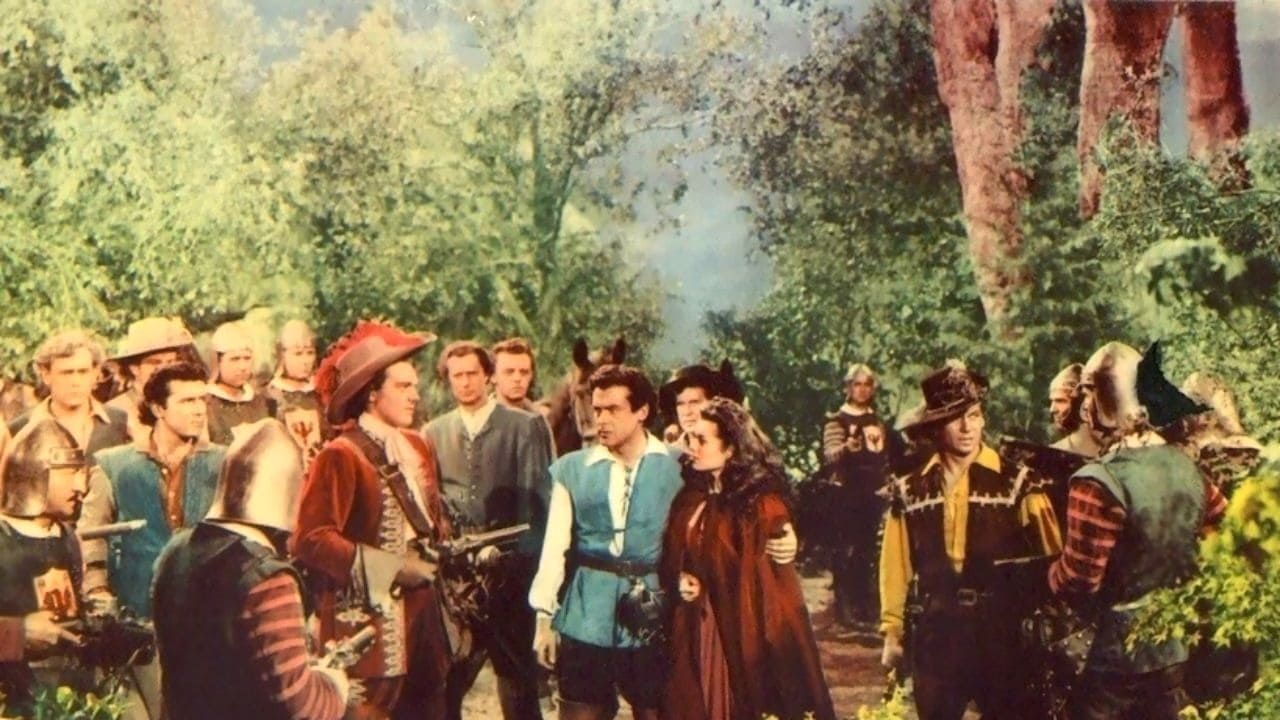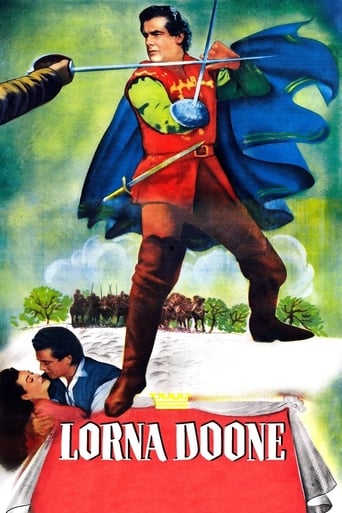AutCuddly
Great movie! If you want to be entertained and have a few good laughs, see this movie. The music is also very good,
AshUnow
This is a small, humorous movie in some ways, but it has a huge heart. What a nice experience.
Brendon Jones
It’s fine. It's literally the definition of a fine movie. You’ve seen it before, you know every beat and outcome before the characters even do. Only question is how much escapism you’re looking for.
Philippa
All of these films share one commonality, that being a kind of emotional center that humanizes a cast of monsters.
clanciai
The painful thing about this film is the grotesque distortion of the original novel. Unfortunately, this is what Hollywood used to do with great classics in the early 50s - there are numerous examples, like for instance Henry King's "King of the Khyber Rifles" with Tyrone Power, reducing him to a puppet and the story to shambles. Here at least the surroundings are true to the book - a recklessly romantic landscape with that stupendous waterfall as the centre of the stage, the music is also very well contrived, but all the rest is just common Hollywood artifice. They try to sugar it with some swashbuckling scenes, great sword fights, a royal intrigue (missing in the novel) and villains as wicked as possible. This was not worth seeing except for the colours, the settings, the romance (more for Barbara Hale than for Richard Greene) and the characters of Charles II and Ron Randell as Tom Faggus, the only fresh touch of humour in this depthless hollowness.
weezeralfalfa
One of a number of film adaptations of the long 1869 novel of the same name by Richard Blackmore. Technicolor released by Columbia in 1951,it stars Barbara Hale as Lorna Doone, and Richard Greene as the rebellious commoner John Ridd. It takes place during the latter part of the reign of Charles II, in the 1670s and '80s, in the wild country of Exmoors, in the southwest of England (not in Scotland, as stated in the summary at this site!) The Doones, as the traditional overlords in one part of the Exmoors, had been recently stripped of their feudal lands and rights ,due to political conflict with the crown. Nonetheless, they continued to live in their castle, on a hilltop, and continued to demand confiscation of the crops and animals of the now free farmers. Thus, they were technically a gang of thieves. The farmers also now had to pay a tax to the crown, since the crown technically owned the land. Thus, both the farmers and the crown are at odds with the Doones. But, the crown is not disposed to send a military force to enforce its edict, and the farmers have no swords or firearms with which to fend off the parasitic Doones. Their extreme alternative threat is to fail to plant crops or burn their crops, or kill all their animals. After seeing the film, it takes little imagination to see the many similarities with Warner's 1938 "The Adventures of Robin Hood". When in rebellion, the farmers usually take to the woods,as did Robin's men. The Doones can be seen as the equivalent of Prince John and his cronies. The local sheriff is working for the bad guys in each case. King Charles and his supporters, then, are the equivalent of King Richard. There is the obligatory rapier duel between the hero and the main bad guy at the end. There is a love story between the hero and a girl of the opposition in both cases, threatened by an obligation to marry one of the nobles. In this film, the contested girl is Lorna Doone, and the chief villains are Carver and Charlesworth Doone, who are essentially the same age as the hero, John. Sir Ensor Doone, the patriarch of the clan, is not quite as rapacious as his sons. Unfortunately, he dies, unleashing further terrorizing by his sons.It's not until Charles and his ally, the Duke of Lorne, arrive with troops to abet the schemes of the farmers that the Doones are finally crushed. Although the ending is provisionally happy, it's best said to be guardedly hopeful. See the film to find out what I mean. It's currently available on YouTube. The main adult actors were fine, except Barbara Hale wasn't the most charismatic "princess". The child actors were a bit stiff. Overall, it's not a bad film. However, "The Adventures of Robin Hood" is certainly more fun, with occasional humor to balance the tense moments, and the personality of Errol Flynn.Other, more recent film versions made for TV, were released in 1990 and 2000. The latter has a significantly higher rating, but is more than twice as long as the present film,at 3 hours. I haven't seen either.
screenman
I say it's a great story, but like so many great stories (Lord of the Rings, for example) it would never get published today. In truth; it's the plot that's really great: Blackmore's telling of it is the the most long-winded lump of verbosity I've ever encountered.Cut to the chase. Here we have the story told in a fairly minimalist though typical way of the time. It would run for at least another 30 minutes if brought to the big screen today. British telly-hunk Richard Greene plays the spirited yeoman John Ridd besotted by his darling Lorna. Unfortunately, She is of the dreaded Doone clan, a hell-raising ruthless family who have used their position of landed status to impose a reign of terror on the countryside that is their titled dominion.A juvenile Ridd first encounters his girlish desire after scaling the supposedly unclimbable waterfall to the Doone lair. It is love at first sight. A young man about his own age, aptly called Carver, and destined to be heir to the Doone estate has similar sexual ambitions, and you can see what's coming. The Doone fortress is practically unassailable. But there's an Achille's heel: the waterfall...I saw this movie ages ago when I was a kid and enjoyed it immensely. A particular exchange stuck in my memory. Young Ridd is discovered where he shouldn't be by the Doone clan and threatened by Carver. But the old patriarch restrains his impetuous heir-apparent and invites Ridd to visit them by more conventional means. It goes something like this:Patriarch:'You must come back and see us when you are tall enough to cast a shadow on our door.' Carver: 'Aye; come back then and cast your shadow if you dare.' Ridd: That I shall, Carver, And I hope you're standing before me.'That's not word-perfect, but it was good, portentous stuff like it. If the rest of the script was no worse, I think it would still be fun.Another commentator has posted a rather disappointing critique and his memory may be better (or fresher) than mine. But if it was no worse that ITV's similarly-vintaged 'Adventures of Robin Hood' also starring Mr Greene then I'd still be willing to give it a go. After all; you can't blame the actors if the sword-fighting was poorly choreographed.Any who visit 'Doone Valley' in the south-west of England will find the landscape far less dramatic than depicted in story or movie.
csrothwec
Looks good in lush, 1950s Hollywood deep colour and the backdrops, (e.g. the castle perched on the edge of the cliff and the thundering water fall which is the only other access to the castle beyond the one road and the drawbridge), look good as well. There is the usual collection of Hollywood support actors on hand to look aggrieved. angry or resentful on cue as well so you "feel at home" when they are on screen, knowing this is from the estbalsihed stable of 1940s/50s Hollywood swash-bucklers. Apart from that, though, this does not have much going for it. Seeing the lead players in action makes you realise clearly why they never made it to the Errol Flynn, (what would HE have done with the lead role???), or even Virginia Mayo league. Even their wooden appearances could have been compensated for, however, if the whole thing, (even just the fight scenes), had had some PACE and ZEST. As it is, the whole thing comes across as a "wheel 'em on", "let's get this scene over" affair, leaving you as glad at the end as the players apparently felt that the thing is finally over. Worth watching ONCE to remind you what Hollywood was ALSO capable of as well as Flynn as Robin Hood, Colman as the Prisoner of Zenda or even Gene Kelly as D'Artagnan!

